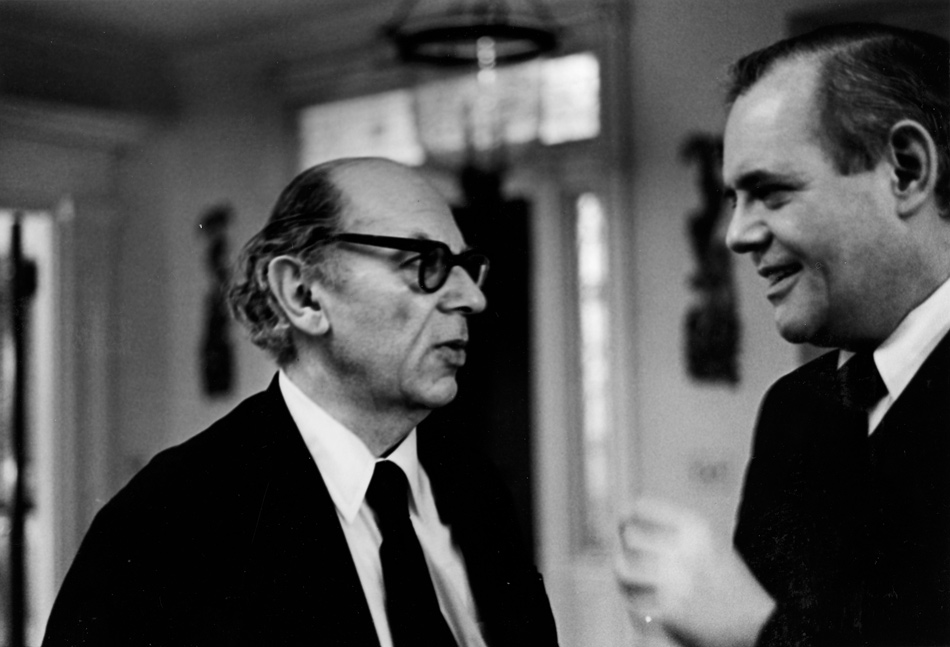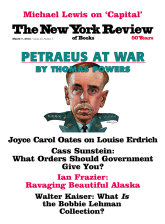In 2013, The New York Review of Books celebrates its fiftieth anniversary. During the course of the year we will reprint excerpts from some other notable pieces published in the Review over the last five decades.
Between 1965 and 2009 The New York Review published over thirty articles and letters by the historian of ideas and political philosopher Isaiah Berlin (1909–1997). The following is an extract from “The Question of Machiavelli,” which appeared in the November 4, 1971 issue. It can be read in full here.
The Question of Machiavelli
Isaiah Berlin
…What has been shown by Machiavelli, who is often (like Nietzsche) congratulated for tearing off hypocritical masks, brutally revealing the truth, and so on, is not that men profess one thing and do another (although no doubt he shows this too) but that when they assume that the two ideals are compatible, or perhaps are even one and the same ideal, and do not allow this assumption to be questioned, they are guilty of bad faith (as the existentialists call it, or of “false consciousness,” to use a Marxist formula) which their actual behavior exhibits. Machiavelli calls the bluff not just of official morality—the hypocrisies of ordinary life—but of one of the foundations of the central Western philosophical tradition, the belief in the ultimate compatibility of all genuine values. His own withers are unwrung. He has made his choice. He seems wholly unworried by, indeed scarcely aware of, parting company with traditional Western morality….
Machiavelli’s cardinal achievement is his uncovering of an insoluble dilemma, the planting of a permanent question mark in the path of posterity. It stems from his de facto recognition that ends equally ultimate, equally sacred, may contradict each other, that entire systems of value may come into collision without possibility of rational arbitration, and that not merely in exceptional circumstances, as a result of abnormality or accident or error—the clash of Antigone and Creon or in the story of Tristan—but (this was surely new) as part of the normal human situation.
For those who look on such collisions as rare, exceptional, and disastrous, the choice to be made is necessarily an agonizing experience for which, as a rational being, one cannot prepare (since no rules apply). But for Machiavelli, at least in The Prince, The Discourses, Mandragola, there is no agony. One chooses as one chooses because one knows what one wants, and is ready to pay the price. One chooses classical civilization rather than the Theban desert, Rome and not Jerusalem, whatever the priests may say, because such is one’s nature, and—he is no existentialist or romantic individualist avant la parole—because it is that of men in general, at all times, everywhere. If others prefer solitude or martyrdom, he shrugs his shoulders. Such men are not for him. He has nothing to say to them, nothing to argue with them about. All that matters to him and those who agree with him is that such men be not allowed to meddle with politics or education or any of the cardinal factors in human life; their outlook unfits them for such tasks.
I do not mean that Machiavelli explicitly asserts that there is a pluralism or even a dualism of values between which conscious choices must be made. But this follows from the contrasts he draws between the conduct he admires and that which he condemns. He seems to take for granted the obvious superiority of classical civic virtue and brushes aside Christian values, as well as conventional morality, with a disparaging or patronizing sentence or two, or smooth words about the misinterpretation of Christianity. This worries or infuriates those who disagree with him the more because it goes against their convictions without seeming to be aware of doing so—and recommends wicked courses as obviously the most sensible, something that only fools or visionaries will reject.
If what Machiavelli believed is true, this undermines one major assumption of Western thought: namely, that somewhere in the past or the future, in this world or the next, in the church or the laboratory, in the speculations of the metaphysician or the findings of the social scientist or in the uncorrupted heart of the simple good man, there is to be found the final solution of the question of how men should live. If this is false (and if more than one equally valid answer to the question can be returned, then it is false) the idea of the sole true, objective, universal human ideal crumbles. The very search for it becomes not merely utopian in practice, but conceptually incoherent….
After Machiavelli, doubt is liable to infect all monistic constructions. The sense of certainty that there is somewhere a hidden treasure—the final solution to our ills—and that some path must lead to it (for, in principle, it must be discoverable); or else, to alter the image, the conviction that the fragments constituted by our beliefs and habits are all pieces of a jigsaw puzzle, which (since there is an a priori guarantee for this) can, in principle, be solved; so that it is only because of lack of skill or stupidity or bad fortune that we have not so far succeeded in discovering the solution whereby all interests will be brought into harmony—this fundamental belief of Western political thought has been severely shaken. Surely in an age that looks for certainties, this is sufficient to account for the unending efforts, more numerous today than ever, to explain The Prince and The Discourses, or to explain them away?
Advertisement
This is the negative implication. There is also one that is positive, and might have surprised and perhaps displeased Machiavelli. So long as only one ideal is the true goal, it will always seem to men that no means can be too difficult, no price too high, to do whatever is required to realize the ultimate goal. Such certainty is one of the great justifications of fanaticism, compulsion, persecution. But [the case is different] if not all values are compatible with one another, and choices must be made for no better reason than that each value is what it is, and we choose it for what it is, and not because it can be shown on some single scale to be higher than another. If we choose forms of life because we believe in them, because we take them for granted, or, upon examination, find that we are morally unprepared to live in any other way (although others choose differently); if rationality and calculation can be applied only to means or subordinate ends, but never to ultimate ends; then a picture emerges different from that constructed round the ancient principle that there is only one good for men.
If there is only one solution to the puzzle, then the only problems are first how to find it, then how to realize it, and finally how to convert others to the solution by persuasion or by force. But if this is not so (Machiavelli contrasts two ways of life, but there could be, and, save for fanatical monists, there obviously are, more than two), then the path is open to empiricism, pluralism, toleration, compromise. Toleration is historically the product of the realization of the irreconcilability of equally dogmatic faiths, and the practical improbability of complete victory of one over the other. Those who wished to survive realized that they had to tolerate error. They gradually came to see merits in diversity, and so became skeptical about definitive solutions in human affairs.
But it is one thing to accept something in practice, another to justify it rationally. Machiavelli’s “scandalous” writings begin the latter process. This was a major turning point, and its intellectual consequences, wholly unintended by its originator, were, by a fortunate irony of history (which some call its dialectic), the basis of the very liberalism that Machiavelli would surely have condemned as feeble and characterless, lacking in single-minded pursuit of power, in splendor, in organization, in virtù, in power to discipline unruly men against huge odds into one energetic whole. Yet he is, in spite of himself, one of the makers of pluralism, and of its—to him—perilous acceptance of toleration.
By breaking the original unity he helped to cause men to become aware of the necessity of making agonizing choices between incompatible alternatives, incompatible in practice or, worse still, for logical reasons, in public and private life (for the two could not, it became obvious, be genuinely kept distinct). His achievement is of the first order, if only because the dilemma has never given men peace since it came to light (it remains unsolved, but we have learned to live with it). Men had, no doubt, in practice, often enough experienced the conflict that Machiavelli made explicit. He converted its expression from a paradox into something approaching a commonplace….




